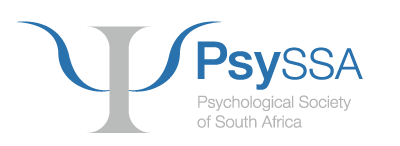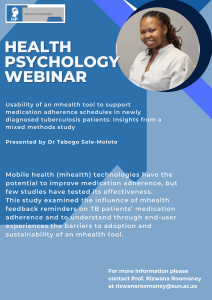
Health Psychology Division (HPD)
The aims of the Division of Health Psychology:
The aim of the Health Psychology Division (HPD) is to create a space where researchers, academics, clinicians, students, and anyone interested in health psychology can share their work and experiences, build collaborations, and ultimately contribute to building a healthy nation. As a division, we send regular updates to our members which contain (1) the latest health psychology research published by South African researchers or conducted in South Africa; (2) updates on group activities; and (3) alerts to health psychology conferences. Our group also publishes newsletters where we share short articles written by members, patients, students and other healthcare professionals about their work and experiences. Our podcast working group produces a series of podcasts highlighting the work of healthcare professionals, researchers, and students and give insight into patient experiences. In 2024 we re-launched our research working group, which conducts research on the state of health psychology in South Africa. Our latest offering will be a series of live webinars, hosted monthly in 2025. We look forward to welcoming members to our vibrant community.
What do members receive by becoming members?
- Exposure to the field of Health Psychology
- Access to our regular updates, newsletters and podcasts
- Networking opportunities
- Attend events for CPD points
- Become part of our Health Psychology researcher database
- Platform to interact with peers and scholars active in the field of Health Psychology
- Opportunities to share your Health Psychology experience with our community
Full Member
Associate
Affiliate
Registered Counsellor & Psychometrist
Psychology Intern
Student Member
HPD Workshop – Living positively with diabetes: The importance of mental health
Join the PsySSA Health Psychology Division (HPD) for a free CPD-accredited online workshop on Living Positively With Diabetes: The Importance of Mental Health. Click here for more information.
Health Psychology Division Networking Database
The Health Psychology Division has launched a networking database of practitioners and researchers to foster collaboration, knowledge exchange, and connections across health psychology and related fields.
Health Psychology & Mental Health Day – Health Psychology Division
Health psychology and World Mental Health Day are united in their mission to promote holistic well-being and highlight the vital connection between mental and physical health. Together, they underscore the power of prevention, early intervention, and education in shaping healthier lives.
HPSIG Podcast: Community and Art: How art-based community involvement in research can aid public health and intervention
In this episode we speak to Prof Lynn Hendricks, an associate professor at Stellenbosch University (SU). In this podcast, Prof Hendricks delves into the positive impact of community involvement in research, public health, and academic knowledge creation. She also touches on using arts as a creative research methodology and the importance of inclusive research.
HPSIG Podcast: The effects of infertility: A clinical psychologist’s perspective
In this episode, we speak to Mandy Rodrigues, a clinical psychologist in private practice and chairperson of the counselling arm of the SASREG Board. In this podcast, Mandy shares insights into the impact of infertility, the stigma surrounding it, and the importance of ethics in the field of fertility.
HPD Webinar: The Importance Of Digital Health Literacy
Presenter: Dr SN Mostert
Date: 25 September 2025
Time: 13:00
HPD Webinar: Hope for women with endometriosis – harnessing a digital cognitive behavioural therapy intervention to relieve persistent fatigue
Date: 28 May 2025
Time: 13:00
World Bipolar Day – 30 March 2025
PsySSA Commemorates World Bipolar Day 2025 - PsySSA shares insightful contributions from the South African Society for Clinical Psychology (SASCP) and the Health Psychology Division (HPD). These reflections aim to raise awareness, reduce stigma, and promote compassionate understanding of bipolar disorder within the South African context.
Health Psychology Webinar: Usability of an mhealth tool to support medication adherence schedules in newly diagnosed tuberculosis patients
We invite you to attend a Webinar conducted by the Health Psychology Division of PsySSA on "Usability of an mhealth tool to support medication adherence schedules in newly diagnosed tuberculosis patients: Insights from a mixed methods study".
HPSIG Podcast: Premenstrual Dysphoric Disorder (PMDD)
In this episode, we speak to Meghan Mosalisa, an emerging psychology researcher, an executive member of the Health Psychology Division of the Psychological Society of South Africa (PsySSA), and a researcher at the South African Medical Research Council. In this podcast, Meghan provides insight into her research on the quality of life of women living with premenstrual dysphoric disorder (PMDD) and the challenges that they experience. She also briefly discusses the stereotypes, stigma, gender bias and social impact attached to the diagnosis of PMDD.
Health Psychology Division Newsletters
- Home
- About us
- PsySSA Structures
- Divisions
- Health Psychology Division (HPD)



















